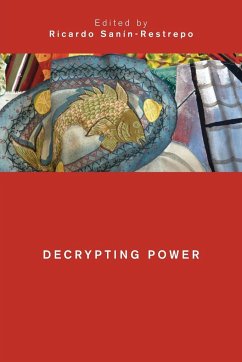Decrypting Power
Herausgeber: Sanín-Restrepo, Ricardo
Decrypting Power
Herausgeber: Sanín-Restrepo, Ricardo
- Broschiertes Buch
- Merkliste
- Auf die Merkliste
- Bewerten Bewerten
- Teilen
- Produkt teilen
- Produkterinnerung
- Produkterinnerung
This book provides a sharp tool for clarifying the nature of power relations in our globalized world. It presents a coherent approach from diverse disciplinary and geopolitical perspectives on key concepts such as power, democracy and the law, connecting studies of coloniality, Caribbean thought, critical legal thinking and Latin American studies.
Andere Kunden interessierten sich auch für
![Decrypting Power Decrypting Power]() Decrypting Power194,99 €
Decrypting Power194,99 €![Geopolitics and Decolonization Geopolitics and Decolonization]() Geopolitics and Decolonization68,99 €
Geopolitics and Decolonization68,99 €![Geopolitics and Decolonization Geopolitics and Decolonization]() Geopolitics and Decolonization202,99 €
Geopolitics and Decolonization202,99 €![Journeys in Caribbean Thought Journeys in Caribbean Thought]() Paget HenryJourneys in Caribbean Thought214,99 €
Paget HenryJourneys in Caribbean Thought214,99 €![Journeys in Caribbean Thought Journeys in Caribbean Thought]() Paget HenryJourneys in Caribbean Thought76,99 €
Paget HenryJourneys in Caribbean Thought76,99 €![Fanon and the Decolonization of Philosophy Fanon and the Decolonization of Philosophy]() Fanon and the Decolonization of Philosophy167,99 €
Fanon and the Decolonization of Philosophy167,99 €![Leaving Behind Leaving Behind]() Tricia MonkLeaving Behind23,99 €
Tricia MonkLeaving Behind23,99 €-
-
-
This book provides a sharp tool for clarifying the nature of power relations in our globalized world. It presents a coherent approach from diverse disciplinary and geopolitical perspectives on key concepts such as power, democracy and the law, connecting studies of coloniality, Caribbean thought, critical legal thinking and Latin American studies.
Hinweis: Dieser Artikel kann nur an eine deutsche Lieferadresse ausgeliefert werden.
Hinweis: Dieser Artikel kann nur an eine deutsche Lieferadresse ausgeliefert werden.
Produktdetails
- Produktdetails
- Global Critical Caribbean Thought
- Verlag: Rowman & Littlefield Publishers
- Seitenzahl: 374
- Erscheinungstermin: 19. Mai 2020
- Englisch
- Abmessung: 229mm x 152mm x 23mm
- Gewicht: 606g
- ISBN-13: 9781786615541
- ISBN-10: 1786615541
- Artikelnr.: 57834695
- Herstellerkennzeichnung
- Libri GmbH
- Europaallee 1
- 36244 Bad Hersfeld
- gpsr@libri.de
- Global Critical Caribbean Thought
- Verlag: Rowman & Littlefield Publishers
- Seitenzahl: 374
- Erscheinungstermin: 19. Mai 2020
- Englisch
- Abmessung: 229mm x 152mm x 23mm
- Gewicht: 606g
- ISBN-13: 9781786615541
- ISBN-10: 1786615541
- Artikelnr.: 57834695
- Herstellerkennzeichnung
- Libri GmbH
- Europaallee 1
- 36244 Bad Hersfeld
- gpsr@libri.de
Ricardo Sanín-Restrepo is a member of the Caribbean Philosophical Association and a professor of legal and political theory at several institutions across Latin America, including Universidad Autónoma de Mexico (UNAM), Universidad Central de Quito, Universidad San Luis de Potosí (Mexico), PUC Rio de Janeiro, and Universidad Javeriana in Colombia, among others. He is the author of Decolonizing Democracy (RLI, 2016).
Part I: Introduction / Introduction: The Meaning of the Encryption of Power
as the Razor's Edge of Politics, Ricardo Sanín-Restrepo / 1. The Encrypted
Constitution: New Ways of Emancipation from Global Power, Gabriel
Méndez-Hincapíe and Ricardo Sanín-Restrepo / Part II: Encryption Law and
Power / 2. The Equivocation that Lies Like Truth, Angus McDonald / 3.
Encrypted International Investment Law in the Age of Neo-Colonialism,
Enrique Prieto-Rios / 4. Transnational Legal Production and its Encryption,
Aleida Hernández-Cervantes / Part III: The Political Subject / 5. The
Practices of the Commons Between Decryption and Insurgent Critique, Vito De
Lucia / 6. Prohibition as Encryption: International Law and the Invitation
into the Crypt of Modernity's Origin, Kojo Koram / 7. The Symbolic Force
and the Encryption of Gender in Law: The Brazilian Example, Marinella
Machado Araujo / Part IV: Encryption, Political Theory and Language / 8.
Metaphors of Decryption: Designs, Poetics, Collaborations, Hanna Musiol /
9. The People vs. Hegel: The Mystifying Transcendence of Time and the
Immanence of Radical Democracy, Ricardo Sanín-Restrepo / Part V: Decryption
and Political Action / 10. Polyvalent Anarchism as a Hypothesis to Decrypt
the Constitution, Gabriel Méndez-Hincapíe and Felipe Orozco / 11. Grounding
Human Rights in Decryption, Alejandro Rosillo / 12. The Field of Popular
Power and Transformative Constitutionalism in Venezuela, Heiner Fechner /
13. Decrypting Global Capitalism: Identifying with the Excluded Outcast in
the Taiwanese Sunflower Movement, Ted Yao-Hung Huang / Index
as the Razor's Edge of Politics, Ricardo Sanín-Restrepo / 1. The Encrypted
Constitution: New Ways of Emancipation from Global Power, Gabriel
Méndez-Hincapíe and Ricardo Sanín-Restrepo / Part II: Encryption Law and
Power / 2. The Equivocation that Lies Like Truth, Angus McDonald / 3.
Encrypted International Investment Law in the Age of Neo-Colonialism,
Enrique Prieto-Rios / 4. Transnational Legal Production and its Encryption,
Aleida Hernández-Cervantes / Part III: The Political Subject / 5. The
Practices of the Commons Between Decryption and Insurgent Critique, Vito De
Lucia / 6. Prohibition as Encryption: International Law and the Invitation
into the Crypt of Modernity's Origin, Kojo Koram / 7. The Symbolic Force
and the Encryption of Gender in Law: The Brazilian Example, Marinella
Machado Araujo / Part IV: Encryption, Political Theory and Language / 8.
Metaphors of Decryption: Designs, Poetics, Collaborations, Hanna Musiol /
9. The People vs. Hegel: The Mystifying Transcendence of Time and the
Immanence of Radical Democracy, Ricardo Sanín-Restrepo / Part V: Decryption
and Political Action / 10. Polyvalent Anarchism as a Hypothesis to Decrypt
the Constitution, Gabriel Méndez-Hincapíe and Felipe Orozco / 11. Grounding
Human Rights in Decryption, Alejandro Rosillo / 12. The Field of Popular
Power and Transformative Constitutionalism in Venezuela, Heiner Fechner /
13. Decrypting Global Capitalism: Identifying with the Excluded Outcast in
the Taiwanese Sunflower Movement, Ted Yao-Hung Huang / Index
Part I: Introduction / Introduction: The Meaning of the Encryption of Power
as the Razor's Edge of Politics, Ricardo Sanín-Restrepo / 1. The Encrypted
Constitution: New Ways of Emancipation from Global Power, Gabriel
Méndez-Hincapíe and Ricardo Sanín-Restrepo / Part II: Encryption Law and
Power / 2. The Equivocation that Lies Like Truth, Angus McDonald / 3.
Encrypted International Investment Law in the Age of Neo-Colonialism,
Enrique Prieto-Rios / 4. Transnational Legal Production and its Encryption,
Aleida Hernández-Cervantes / Part III: The Political Subject / 5. The
Practices of the Commons Between Decryption and Insurgent Critique, Vito De
Lucia / 6. Prohibition as Encryption: International Law and the Invitation
into the Crypt of Modernity's Origin, Kojo Koram / 7. The Symbolic Force
and the Encryption of Gender in Law: The Brazilian Example, Marinella
Machado Araujo / Part IV: Encryption, Political Theory and Language / 8.
Metaphors of Decryption: Designs, Poetics, Collaborations, Hanna Musiol /
9. The People vs. Hegel: The Mystifying Transcendence of Time and the
Immanence of Radical Democracy, Ricardo Sanín-Restrepo / Part V: Decryption
and Political Action / 10. Polyvalent Anarchism as a Hypothesis to Decrypt
the Constitution, Gabriel Méndez-Hincapíe and Felipe Orozco / 11. Grounding
Human Rights in Decryption, Alejandro Rosillo / 12. The Field of Popular
Power and Transformative Constitutionalism in Venezuela, Heiner Fechner /
13. Decrypting Global Capitalism: Identifying with the Excluded Outcast in
the Taiwanese Sunflower Movement, Ted Yao-Hung Huang / Index
as the Razor's Edge of Politics, Ricardo Sanín-Restrepo / 1. The Encrypted
Constitution: New Ways of Emancipation from Global Power, Gabriel
Méndez-Hincapíe and Ricardo Sanín-Restrepo / Part II: Encryption Law and
Power / 2. The Equivocation that Lies Like Truth, Angus McDonald / 3.
Encrypted International Investment Law in the Age of Neo-Colonialism,
Enrique Prieto-Rios / 4. Transnational Legal Production and its Encryption,
Aleida Hernández-Cervantes / Part III: The Political Subject / 5. The
Practices of the Commons Between Decryption and Insurgent Critique, Vito De
Lucia / 6. Prohibition as Encryption: International Law and the Invitation
into the Crypt of Modernity's Origin, Kojo Koram / 7. The Symbolic Force
and the Encryption of Gender in Law: The Brazilian Example, Marinella
Machado Araujo / Part IV: Encryption, Political Theory and Language / 8.
Metaphors of Decryption: Designs, Poetics, Collaborations, Hanna Musiol /
9. The People vs. Hegel: The Mystifying Transcendence of Time and the
Immanence of Radical Democracy, Ricardo Sanín-Restrepo / Part V: Decryption
and Political Action / 10. Polyvalent Anarchism as a Hypothesis to Decrypt
the Constitution, Gabriel Méndez-Hincapíe and Felipe Orozco / 11. Grounding
Human Rights in Decryption, Alejandro Rosillo / 12. The Field of Popular
Power and Transformative Constitutionalism in Venezuela, Heiner Fechner /
13. Decrypting Global Capitalism: Identifying with the Excluded Outcast in
the Taiwanese Sunflower Movement, Ted Yao-Hung Huang / Index








